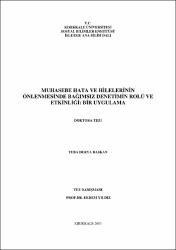Muhasebe hata ve hilelerin önlenmesinde bağımsız denetimin rolü ve etkinliği: Bir uygulama
Özet
Bir ülke ekonomisinin etkinliğinde en önemli etmenlerden biri o ülkede var olan işletmelerin başarısıdır. İşletmelerin başarılı olabilmesi için yapılması gerekenlerden biri denetim ve muhasebe tekniklerinin uygun kullanılmasıdır. Muhasebe sistemi, işletme faaliyetlerinin Genel Kabul Görmüş Muhasebe İlkelerine uygun şekilde düzenlenmesini hedeflemektedir. Ayrıca kayıt dışı ekonominin engellenmesi ve vergi kaçakçılığının önlenmesinde muhasebe sisteminin tutarlı şekilde işlemesi önemlidir. Bunlar da ancak düzgün işleyen muhasebe düzeni ve muhasebenin etkili bir şekilde denetimi ile mümkündür. İşletmeler bunun için de bağımsız denetim firmalarından yoğun bir şekilde yardım almaya başlamışlardır. Bağımsız denetim, işlemelerin genel kabul görmüş denetim standartlarına göre finansal tabloların hazırlanıp hazırlanmadığını ve muhasebenin uygun şekilde kullanılarak gerçek durumu yansıtıp yansıtmadığını tespit etmektedir. Aynı zamanda bağımsız denetim firmaların finansal tablolarının uygunluğunu tespit ederken, muhasebede yapılan hata ve hileleri belirlemede ve önlemede etkin olmaktadır. Bu çerçevede çalışmanın ilk aşamasında muhasebe hata ve hilelerinin kavramsal yapısına bakılmış, bu hata ve hilelerin nerelerde ve ne şekilde ortaya çıktığı ele alınarak, küresel ölçekte etkili muhasebe ve denetim skandalları ile şirket iflasları incelenmiştir. Sonrasında bağımsız denetim kurumlarının dünyada ve ülkemizdeki gelişimi, gerekliliği, karşılaştıkları sorunlar, bağımsız denetim kurumları ile oluşturulan düzenlemeler ve etkileri, hukuki ve idari sorumlulukları incelenmeye çalışılmıştır. Aynı zamanda denetimin etkili olabilmesi için işletmelerin izledikleri yollar incelenmiş ve uygulanan yaptırımlara bakılmıştır. Sonraki aşamada ise, bağımsız denetim firmalarının etkinliğini daha güvenilir şekilde ölçebilmek adına bağımsız denetim firmalarıyla çalışma zorunluluğu olan Borsa İstanbul?da işlem gören şirketlerde yapılan anket uygulaması ile konuya ilişkin algılara ulaşılmaya çalışılmıştır. Verilere ulaşıldıktan sonra korelasyon, frekans analizi ve faktör analizi istatistik yöntemleri ile bulgular yorumlanmış, sorunlar ortaya konmuş ve çözüme yönelik öneriler sunulmuştur. One of the most important factors that contributes to a country?s economic efficiency is the achievement of the companies in that country. One of the things required to be a succesful company is to apply auditing and accounting techniques properly. The accounting system aims to conduct the companies? operations in consistent with Generally Accepted Accounting Rules. Furthermore, performing accounting system properly is important to eliminate informal economy and tax fraud. These can be only possible with an orderly accounting system and efficient auditing accounting system. For this reason, companies have started to receive support from independent auditing firms. Independent auditing confirms whether the companies prepare their financial statements according to generally accepted auditing standards and use accounting system properly to reflect the reality. At the same time, independent auditing, confirming financial statements? consistency, is effective in determining and eliminating errors and fraud. Within this framework, at the beginning of this study the concept of fraud and error is examined, where and how they rises is addressed and accounting and auditing scandals and bankruptcies in global scale are discussed. Later, the development of independet auditing companies in the World and in Turkey; the necessity of them; the problems they face with; legal infrastructure for them; and their legal and administrative responsibilities are studied. Besides, the methods employed for an effective auditing are analyzed and sanctions implemented are probed. After that, in order to quantify the efficiency of independent auditing firms more reliably, a survey is implemented to the companies that are traded at Istanbul Stock Exchange and have the obligation to work with independent auditing firms, searching for their perceptions about independent auditing. After collecting the data, through statistical methods such as correlation, frequency analysis and factor analysis, the findings are commented; problems are determined and suggestions are offered.
















